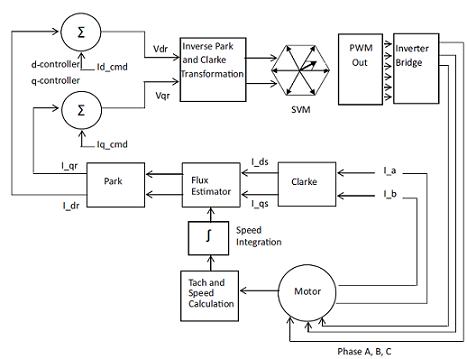
This application note discusses the Field Oriented Control (FOC) of 3-phase AC induction motors. Field Oriented Control is also referred to as Space Vector Control. Vector control provides efficient and accurate control of the motor’s speed and torque, for example, in a DC motor, where the motor’s field flux and armature MMF are always orthogonal to each other, independent of the speed. Additionally, RAM and ROM memory is continuously checked for Class B requirements.
3-phase AC-induction motors are mechanically simple, rugged, highly reliable, lower in cost per horsepower than DC motors, and capable of more torque and efficiency than single-phase AC motors. Depending on the size, these motors are more efficient than permanent synchronous motors. A 3-phase AC induction motor can be controlled by varying its inputs according to a mathematical model of the rotor flux field in a complex vector space. Vector Control has been the domain of Digital Signal Processors (DSPs) and a few 32-bit and 16-bit microcontrollers. Cost pressures and increased consumer expectations have driven design engineers to seek basic hardware solutions that extract maximum performance from motors used in consumer goods. This application note demonstrates the use of Zilog’s Z16FMC ZNEO! 16-bit microcontroller to implement Vector Control of an AC induction motor.
The Z16FMC Series of Flash MCUs used in this application are based on Zilog’s advanced 16-bit ZNEO CPU core and are optimized for motor control applications.
Advertisement

Learn more about IXYSZilog





